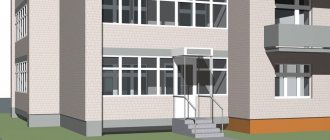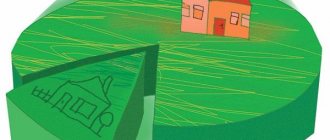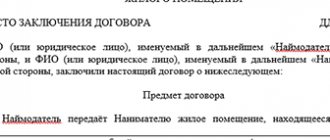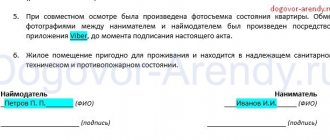Owner of residential premises. Rights and obligations
Housing legislation with the adoption of the Housing Code of the Russian Federation has defined the right of ownership of housing as one of the main values of modern society. The law stands guard over the protection of this right; its responsibilities include guaranteeing and providing conditions for the exercise of the rights of owners of residential premises.
Residential owner:
- citizen;
- state;
- legal entities;
- municipalities;
- foreign states;
- foreign citizens and legal entities;
- international organizations;
- other.
The term “homeowner” applies to all categories of persons who have ownership rights to residential premises. Regulation of the rights and obligations of the owner of residential premises is entrusted to the Civil and Housing Codes of the Russian Federation. Art. 30 of the Housing Code of the Russian Federation determines the procedure for owning residential premises and the responsibilities of the owner.
Rights of the owner of a residential premises:
- possession;
- use;
- order;
- provision of possession or use of residential premises to other citizens on the basis of a rental agreement;
- transfer for use to legal entities under a lease agreement;
- provision under a free use agreement.
The legality of using residential premises and the limits of its use directly depend on the purpose of the housing and the definition of the premises as residential. Clause 2 Art. 15 and paragraph 1 of Art. 17 of the Housing Code of the Russian Federation states that residential premises intended for the residence of citizens must necessarily be suitable for such residence.
Responsibilities of the owner of a residential premises:
- maintenance of the premises;
Under the maintenance of premises, the legislation implies the owner’s concern for the state of safety of his residential premises. The owner is obliged to invest in the premises he owns and bear the costs of repairs and maintenance.
The burden of maintaining the premises may be transferred to other persons, organizations, or the state in accordance with existing federal laws or in accordance with the contract.
So, for example, in order to provide assistance to certain categories of citizens who own residential premises, due to their financial situation, physical condition, services to the state, the state assumes responsibility for the maintenance of residential premises belonging to such citizens. Also, the owner of a residential premises may assign responsibilities for its maintenance to other persons, provided that the premises are transferred to them for temporary use or possession. A lease agreement often provides for the transfer of the owner’s responsibilities for the maintenance of residential premises to the tenants, but does not exclude the owner’s responsibility for such maintenance.
- maintenance of the common property of the owners (provided that the residential premises are an apartment in an apartment building); The common property in an apartment building obliges the owner of the residential premises, namely the apartment, to bear the costs of its maintenance, in that part of the amount of costs that corresponds to his share.
- maintenance of the common property of the room owners (provided that the living space is a room in a communal apartment);
- maintaining the premises in proper condition;
- preventing mismanagement of the premises;
The owner of a residential premises must not allow mismanagement of the residential premises belonging to him. Mismanagement of residential premises may serve as grounds for termination of ownership rights. An administrative offense will be mismanagement of residential premises that violates the relevant specific requirements of fire safety rules or sanitary and epidemiological standards. Causing harm by mismanagement of residential premises provides for civil liability of the owner.
- respect for the legitimate interests and rights of neighbors;
Neighbors are the owners of neighboring residential premises and the persons living in them. The rules for the use of residential premises are approved by the Government of the Russian Federation; compliance with current standards is a prerequisite for the above obligations.
- compliance with the rules for the use of residential premises;
- compliance with the rules for maintaining common property, owners of premises in an apartment building.
The inalienable right of the owner of residential premises is to rent or lease this premises for the purpose of systematically making a profit. The income that the owner receives from renting out the premises is subject to taxation in accordance with the Tax Code of the Russian Federation. To make a profit from renting or renting premises, the owner does not have to register as an individual entrepreneurship.
The right of ownership presupposes not only the existence of rights, but also the existence of responsibilities for the owner of a residential premises. Violation by the owner of his duties can lead to disastrous consequences, such as the sale of his property at auction or administrative punishment in the form of a fine. Protecting the rights and interests of the owner is the direct task of a lawyer in housing cases. The assistance of a qualified specialist in housing law will protect the owner of a residential premises from violation of his rights and ensure the guaranteed fulfillment of his duties by other owners.
If you are interested in the topic of housing legislation, we recommend that you also read “reconstruction and redevelopment of residential premises.”
Sincerely, Victoria Demidova, lawyer.
Deprivation of property rights
The liability of the owner of a residential premises in the form of deprivation of ownership of the apartment is an extreme measure. Grounds – repeated violations recorded in court decisions and decisions of administrative bodies.
The municipal body, having accumulated material, can file a claim. Ownership is terminated and the apartment is put up for auction.
At the same time, the Code of Civil Procedure establishes a ban on foreclosure on a single dwelling and the land plot on which it is located. Deprivation of property rights is applied in the event of repeated prohibitions in the Code of Administrative Offences.
If violations are committed by other residents, in particular, systematic flooding of neighboring apartments occurs, the rule regarding the responsibility of the owner of the residential premises for improper use of the residential premises still applies. Judicial practice is based on this.
Right of use
An owner who has title to real estate has limited benefits. Speaking about the use of residential premises, everyone is equal in this matter. The owner or other owner cannot infringe on other residents, for example, in the use of the kitchen, toilet, common areas, etc.
An agreement between the owner and the person moving in may establish the conditions for the new tenant to use the house or apartment. For example, which premises are transferred to his full use, and which his access to is limited.
The agreement is concluded in accordance with the rules of the Civil Code. The right of residence entails the duties and responsibilities of the family members of the owner of the residential premises.
Commentary on Article 30 of the RF Housing Code
Article 30 of the Housing Code of the Russian Federation establishes the basic rights and obligations of a person who has the right of ownership of residential premises. Regulation of the rights and obligations of owners of residential premises is a kind of novelty in housing legislation. The previously existing Housing Code of the RSFSR did not regulate this group of social relations due to the specifics of civil circulation that developed under the conditions of the Soviet state.
The concept of ownership, including residential premises, as well as the rights and obligations of the owner, were for the first time most clearly regulated by the Civil Code, and the first attempts to regulate property issues were made in the USSR Law “On Property in the USSR”.
In modern conditions, the development of housing relations is unthinkable without the institution of ownership of residential premises. This circumstance led to the appearance in the Housing Code of the Russian Federation of an entire section devoted to the right of ownership and other real rights to residential premises.
Property rights include three main components: the right of possession, the right of use, and the right of disposal. In this regard, paragraph 1 of the commented article established that the owner of a residential premises exercises the rights of ownership, use and disposal in relation to it in accordance with the purpose of the residential premises and the limits of its use. The purpose and limits of use of residential premises are established in Art. 17 LC RF (see commentary).
Clause 2 of Art. 30 of the Housing Code of the Russian Federation is devoted to one of the powers of property - the right to dispose of residential premises. Thus, the owner has the right to provide residential premises belonging to him to another citizen or legal entity for possession and (or) use.
In this case, various types of contracts are used to dispose of residential premises. Residential premises may be provided to citizens for possession and (or) use on the basis of rental agreements, free use, etc. A legal entity is provided with residential premises for possession and (or) use on the basis of a lease agreement or on other legal grounds.
The Housing Code of the Russian Federation pays attention only to the transfer of ownership and (or) use of residential premises to another person. In this case, we are not talking about agreements, the legal consequence of which is the transfer of ownership of residential premises, in other words, alienation. The fact is that the transfer of ownership of residential premises is a subject of regulation to a greater extent by civil rather than housing legislation, and its regulation is concentrated in the Civil Code of the Russian Federation.
Paragraph 3 of this article reflects the civil law principle of “burden of property”. The burden of ownership, i.e. The obligation to maintain the property in proper form, payment of various payments, taxes, fees and duties, as a general rule, always lies with the owner of the thing.
Housing legislation in this sense is no exception. The owner of a residential premises bears the burden of maintaining this premises. If such a premises is an apartment and is located in an apartment building, then the owner also bears the burden of maintaining the common property of the owners in the apartment building. If the premises are not a separate apartment, but are, say, a room in a communal apartment, then its owner also bears the burden of maintaining the common property of the owners of the rooms.
Clause 4 art. 30 of the Housing Code of the Russian Federation is devoted to the main, most general responsibilities of owners of residential premises. Owners of residential premises are obliged to:
maintain the premises in proper condition;
prevent mismanagement of residential premises;
respect the rights and legitimate interests of neighbors;
comply with the rules for using residential premises;
comply with the rules for maintaining the common property of premises owners in an apartment building.
You can do it yourself
What basic rights do you have as a homeowner?
The owner of a residential premises exercises the rights of ownership, use and disposal of the residential premises belonging to him by right of ownership.
The owner of a residential premises has the right to provide possession and (or) use of residential premises belonging to him by right of ownership to a citizen on the basis of a lease agreement, a contract of gratuitous use or on other legal grounds.
That is, you have the right to use your home yourself and at your own discretion: live in it yourself, rent it out, sell it or donate it, provide housing for free of charge, use it in another way, if this use does not violate the rights of other citizens.
In addition to rights, the owner also has certain responsibilities.
What are the main responsibilities of a homeowner?
The owner of a residential premises bears the burden of maintaining this premises, is obliged to maintain this premises in proper condition, not allowing mismanagement of it, to respect the rights and legitimate interests of neighbors, and the rules for the use of residential premises.
That is, despite the fact that the apartment is your property, you must consider the interests of your neighbors and maintain the housing in a habitable condition.
If you own an apartment or room, then you bear the burden of maintaining the common property in the corresponding apartment building.
That is, you are obliged to bear the costs, for example, of repairing the roof of the house or pipes in the basement. These expenses are included in the monthly utility bill in the column “Maintenance and repair of housing.”
What is common property in an apartment building?
The owners of premises in an apartment building own, by right of common shared ownership, premises in this building that are not parts of apartments and are intended to serve more than one premises in this building, including inter-apartment landings, stairs, elevators, elevator and other shafts, corridors, technical floors, attics, basements in which there are engineering communications, other equipment serving more than one room in a given house (technical basements), as well as roofs enclosing load-bearing and non-load-bearing structures of a given house, mechanical, electrical, sanitary and other equipment located in this house outside or inside the premises and serving more than one room, the land plot on which this house is located, with elements of landscaping and landscaping and other objects intended for the maintenance, operation and improvement of this house, located on the specified land plot.
Thus, any premises and objects associated with the house, which are intended for use not only by the residents of one apartment, belong to common property.
Why is it necessary to distinguish between property related to your apartment (yours personally) and common property?
Firstly, all owners of the house can use the common property, not just you. That is, you cannot fence off part of the landing and declare that now only you use it.
Secondly, the costs of maintaining common property are borne by all owners of an apartment building, including by paying fees for the maintenance and repair of housing. That is, you alone cannot be forced to repair the roof or basement; all residents of the house are required to pay money for these purposes. Often there is an agreement with a management company for the maintenance of a house, therefore, this company is obliged to carry out routine repairs of common property at the expense of the funds that residents pay according to the receipt.
In this case, the amount of expenses for maintaining common property in the house is determined in proportion to the total area of the living space belonging to you. That is, the larger your apartment, the more you pay under the line “Housing maintenance and repairs” and vice versa.
What is a general meeting of owners of premises in an apartment building and why is it needed?
The general meeting of owners of premises in an apartment building is the management body of the apartment building.
The competence of the general meeting of owners of premises in an apartment building includes:
- making decisions on the reconstruction of an apartment building (including its expansion or superstructure), construction of outbuildings and other buildings, structures, structures, repair of common property in an apartment building;
- making decisions on the limits of use of the land plot on which the apartment building is located, including the introduction of restrictions on its use;
- making decisions on the transfer of common property in an apartment building for use, for example, which premises to rent out;
- choosing a method for managing an apartment building and a number of other issues.
These issues can only be resolved at a general meeting. Therefore, it is very important to take part in them if you are not indifferent to the fate of your home.
Procedure for holding a general meeting in an apartment building
Owners of premises in an apartment building are required to annually hold an annual general meeting of owners of premises in an apartment building.
An extraordinary general meeting of owners of premises in an apartment building may be convened at the initiative of any of the owners. That is, you also have this right.
The general meeting of owners of premises in an apartment building is valid (has a quorum) if the owners of premises in this building or their representatives with more than fifty percent of the votes of the total number of votes took part in it. If there is no quorum for holding an annual general meeting of owners of premises in an apartment building, a repeat general meeting of owners of premises in an apartment building must be held.
The owner, on whose initiative a general meeting of owners of premises in an apartment building is convened, is obliged to inform the owners of premises in this building about the holding of such a meeting no later than ten days before the date of its holding. Within the specified period, a notice about holding a general meeting of owners of premises in an apartment building must be sent to each owner of premises in this building by registered mail, or handed to each owner of premises in this building against signature, or posted in the premises of this building, accessible to all owners of premises in this building. .
What should be indicated in the notice of a general meeting?
The notice of holding a general meeting of owners of premises in an apartment building must indicate:
- information about the person on whose initiative this meeting is convened;
- the form of holding this meeting (meeting or absentee voting);
- date, place, time of this meeting or, if this meeting is held in the form of absentee voting, the closing date for accepting decisions of owners on issues put to vote, and the place or address where such decisions should be transferred;
- the agenda of this meeting;
- the procedure for familiarizing yourself with the information and (or) materials that will be presented at this meeting, and the place or address where they can be viewed.
Decisions of the general meeting of owners of premises in an apartment building
Decisions of the general meeting of owners of premises in an apartment building on issues put to vote are made by a majority vote of the total number of votes of owners of premises in an apartment building participating in this meeting.
Some decisions, for example, the decision to reconstruct a residential building, are made by a majority of at least two-thirds of the total number of votes of the owners of premises in an apartment building.
Decisions of the general meeting of owners of premises in an apartment building are documented in minutes in the manner established by the general meeting of owners of premises in a given building.
The decision of the general meeting of owners of premises in an apartment building, adopted in the manner prescribed by this Code, on issues within the competence of such a meeting, is binding on all owners of premises in an apartment building, including those owners who did not participate in the vote.
Normative base:
- Housing Code of the Russian Federation
- Civil Code of the Russian Federation







